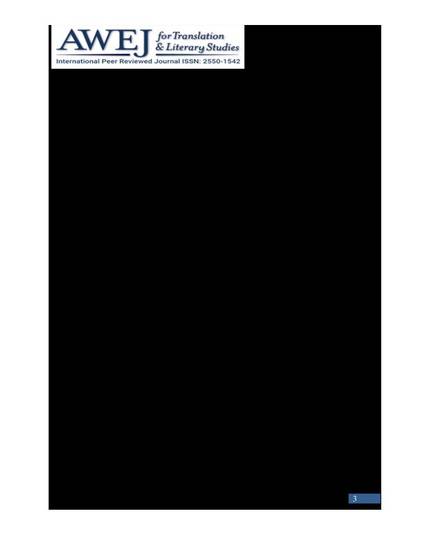
Article
Foreword
AWEJ for Translation & Literary Studies
(2024)
Abstract
It is my great honour to write this foreword to celebrate the publication of Volume 8, Number 1, February issue of The Arab World English Journal for Translation and Literary Studies (AWEJ-tls) in 2024. This current issue brings together 18 papers that cover concerns in translation studies, literary theories, and the relationship between literary studies and other disciplines. They all provide novel perspectives in these areas, which can assist the readers to identify new research opportunities.
Today, as the world becomes increasingly diverse, translation studies play a more significant role in uniting various cultures. Several papers in this collection present research outputs demonstrating translation’s role in intercultural communication. They propose that translating original works into world literature can enhance their circulation, explore what strategies people use in translating culture-specific items, and examine how translation can serve as a catalyst for coexistence and mutual understanding across ethnic groups. Different from the common view that translation studies focus on converting one language into another and enhancing mutual understanding between two groups, these papers demonstrate that the discipline has a broader utility in facilitating a universal understanding of diverse cultures and languages.
In addition, with the prevalence of digital translation tools, the translation profession encounters unprecedented challenges. A few other papers in this collection provide valuable insights for the translation profession. They discuss the frequent poetry translation failure in replicating the original texts’ prosodic features, the efficiency of applying Juliane House’s model to evaluate the accuracy of political translation, and that the recognition of translators’ contributions in a translation of an original work varies depending on how the author and translator collaborate. There are two noteworthy viewpoints from these papers. Firstly, the translation quality is dependent on various linguistic aspects, which makes it difficult to be replaced by digital translation tools. Secondly, it is crucial to investigate the creativity of translators in their work and offer recognition of their professional status when they collaborate with authors of the original works throughout the translation process.
In the field of literary studies, a notable contemporary challenge pertains to the lack of recognition of the significance of literature. Several papers in this collection provide insights into how academics can respond to this challenge by establishing linkages between literary studies and social sciences and humanities. On the one hand, literature is a means that can reveal the power structure in society, the relationship between habitus and fields, and the social problems and solutions; on the other hand, literature can symbolize human uncanny and personality disorders. The former studies associate literary studies with social justice studies, whereas the latter studies associate literary studies with psychological studies.
Additionally, literary theories are establishing linkages between previously disconnected perspectives. For instance, a paper in the collection explores the similarities and differences between stand-up comedy and monologue and reveals that the former evolved naturally from the latter as a result of social media developments; another paper studies resistance narrative in a broader context using the framework of Arabic Science Fiction and demonstrates that this newer approach of investigation can discover that the plots in the narratives are associated with imaginative incidents. These studies contribute to the establishment of a more comprehensive theoretical framework for studying literature.
I would like to thank the Editor-in-Chief, Prof. Khairi Alzubaidi, who allowed me to guest edit the current edition of AWEJ-tls, the authors who submitted their research outputs, and the journal’s editorial team who dedicated to reviewing the manuscripts and providing feedback. I recommend this edition of the journal for researchers and practitioners in the disciplines of translation and literary studies. It serves as an excelling academic community that connects us and our ideas.
Keywords
- Arabic science fiction,
- digital translation tools,
- literary studies,
- poetry translation failure,
- political translation,
- translation profession,
- translation studies
Disciplines
Publication Date
Winter February 15, 2024
Citation Information
Ning LIU. "Foreword" AWEJ for Translation & Literary Studies Vol. 4 Iss. 1 (2024) p. 3 - 4 ISSN: 2550-1542 Available at: http://works.bepress.com/awejfortranslation-literarystudies/452/